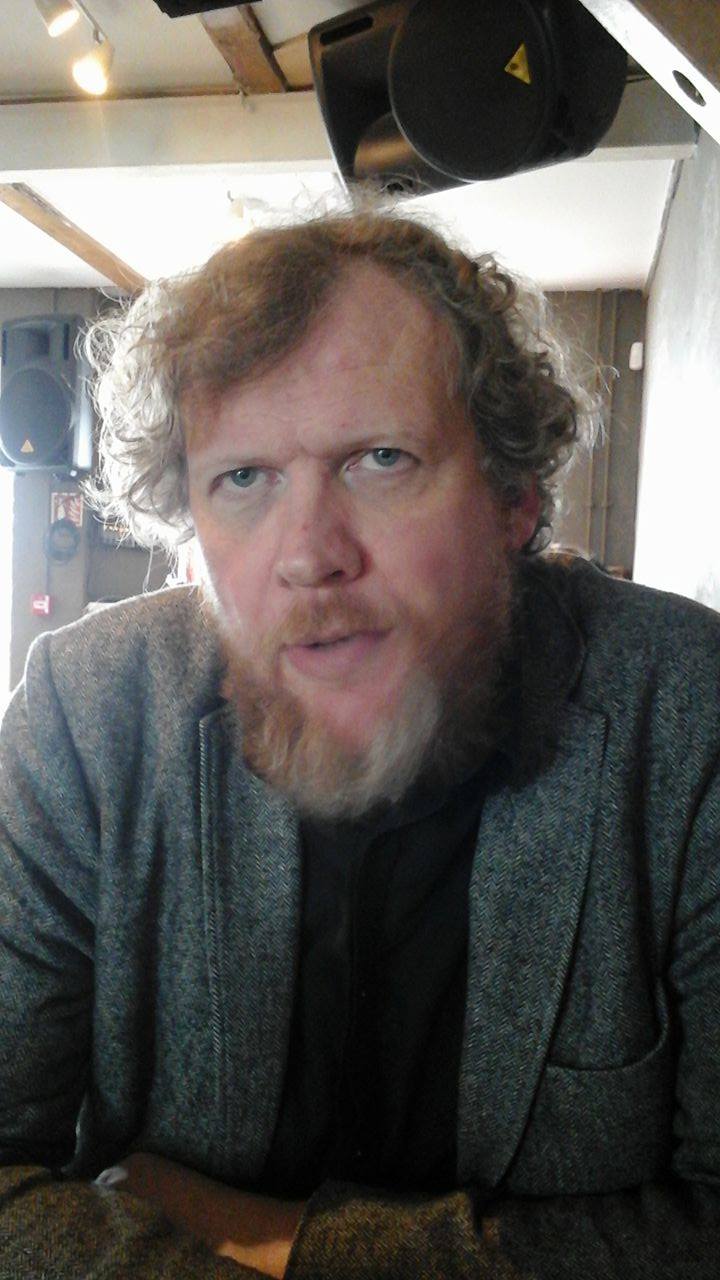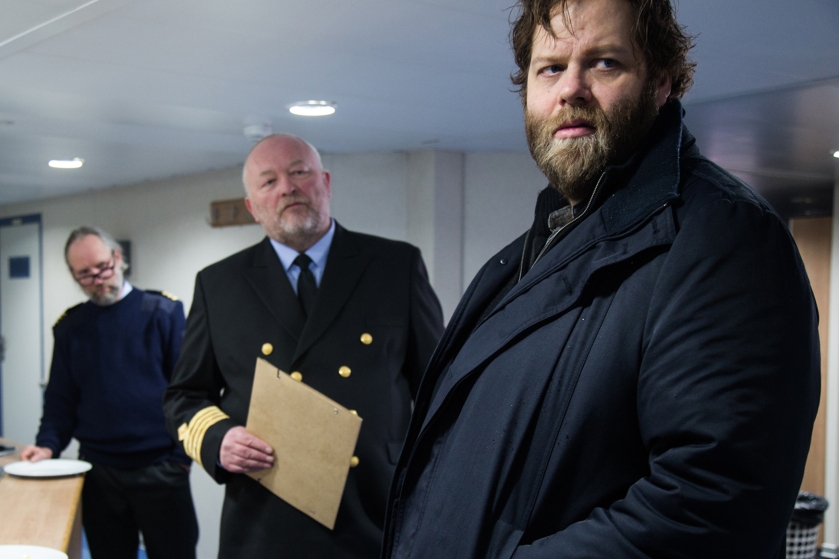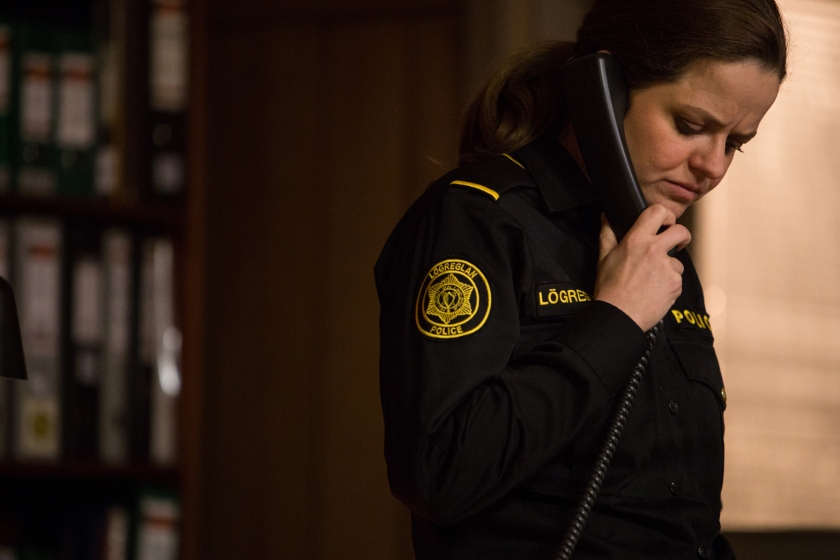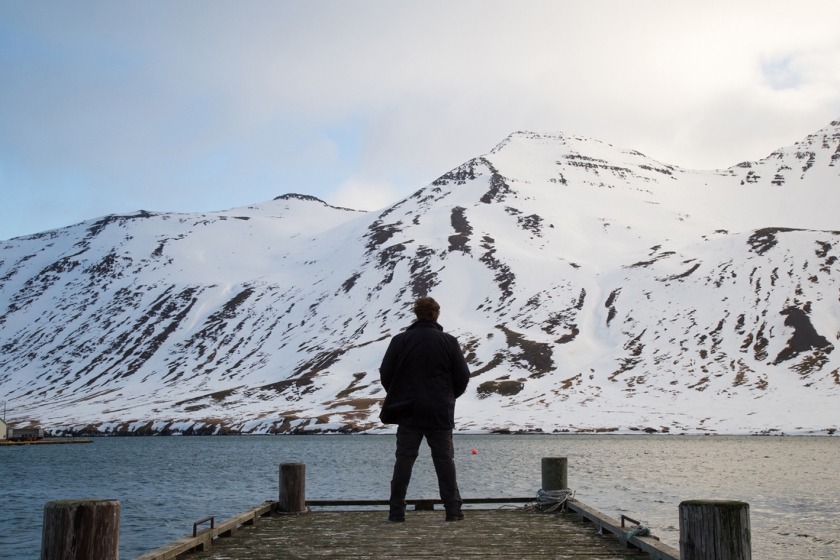
Trapped’s head writer discusses the breakout hit
Making history as the first Icelandic crime series to air in the UK, Trapped‘s complex web of murder, corruption, and intensely claustrophobic atmosphere instantly captivated Nordic Noir fans.
Head writer Sigurjón Kjartansson kindly agreed to meet in a Reykjavik coffee shop and discuss the series, his career to date, and future plans.
Before embarking on successful writing career Sigurjón was a member of influential hard rock band HAM. Away from music, a comedy partnership with future Mayor of Reykjavik Jon Gnarr kick started a career in television. Sigurjón has created and co-created some of the most successful TV series in Icelandic history: The Press (Pressa), The Court (Réttur). An adaptation of Aevar Orn Josepsson’s noir novels was a ratings smash.
Since 2012 Sigurjón has been Head of Development at RVK Studios. Together with Baltasar Kormákur (Jar City, Everest) and Magnús V. Sigurdsson, Sigurjón shepherded the series that would be a success in Iceland, France, Germany, Norway, and the UK.
Trapped is the first Icelandic drama series to air in the UK. It’s arrived at a time when the Icelandic film and TV industry is flourishing. Some really great stuff is on the way. Case is coming soon from Sagafilm also from your production company The Oath will be released later n the year. Do you feel more confident about the future prospects internationally for Icelandic film and TV?
Definitely. Definitely. Film was actually of ahead of TV there. There have been successes like ten years ago with Jar City in the UK and Europe and other movies. Some of them by Baltasar and others like Of Horses and Men, etc. We kind of when we started Trapped like four years ago. More than four years ago. Then it was like me and Baltasar we were talking about doing television on the same model as he had succeeded in films. We started developing and going round Europe to raise funding for this.
I noticed on the end credits that their are multiple partners. The funding isn’t just from Icelandic Film Fund.
No, no. That was earlier. The Press and The Court series they were mostly just funded locally. It was the TV station and the film and TV fund and also sometimes we got something from the Nordic fund. That was it. That’s how we did the series. It was very cheap. That’s how we did it. OK we could do like six times 45 minutes, shoot for 35 days and just get on with it. But that’s just… You don’t get any further than that, I mean this is just there. With ready made material you don’t get the pressure of selling it abroad . It’s not that impressive, you know. And we kind of knew that of course making Trapped would be much more expensive mostly because we had to shoot it out of town and it was a longer series. It was ten times 50 minutes and that meant we had to have partners in Germany, at least, and preferably France which we did. France television said yes from the board. And then finally when ZDF said yes we knew that we were finally going into production.

Do you think this is a new form of production that may become commonplace in Icelandic TV? Securing funding from international partners.
I think this is key. We want to make TV comparable to foreign TV. We need to. Icelandic audiences are used to quality television from all over the world. When they see Icelandic television it has to be comparable. And we are competing with with that. So when it’s successful the whole nation is watching and then its very successful. Other than that it also ensures if you just look at from the local point of view it also secures the local station. They know that they would never be able to finance the whole thing altogether but maybe ten percent and maybe they can come up with development fee. That is very good for us. We gain from that. So we can start writing and pitching for the rest of the funding. We kind of quickly realized if it’s not flying, I’m not saying we have never been there, but it’s like we should kind of quickly realise that if it’s not flying abroad it’s not flying., it’s probably not a good series because… We have, I mean number one as in Trapped, tried to be as local as possible. We never thought OK we are making an international series. It was just.. We just went with it. This is drama. This is a small town. It’s accidentally in Iceland. It could happen everywhere. We’re just making good drama and that travels.
I think you are right in the sense that it could happen anywhere. The isolated village as a concept there are other examples in film and literature. For instance, John Wyndham The Midwych Cuckoos which was filmed as Village of Damned.
That could have happened in Iceland. (laughs)
It’s not a crime story but it’s an example of the isolated community facing external and internal threats. You’ve added Icelandic elements to it. The weather is a character in any Icelandic drama. Having just driven down from from the north I know…
Did you go to Siglufjörður? The place where we shot.
I’m going there in November. I think it’s best to experience it when the weather is at its most extreme.
Of course but actually the most extreme weather scenes we shot they were actually shot in April 2015. It was like crazy. We had this weekend coming. We were editing All the principal photography was finished. We were kind of we need more weather, OK maybe we’ll do it in the fall. In the end this weather forecast came that it would be like crazy this weekend of like the thirteenth of April or something. So I went with a crew there to shoot those crazy scenes.
Fortitude filmed in Iceland. They were unlucky. They had no snow and had to import fake snow.
That’s why we decided not to shoot it in the east. Because Fortitude had such a bad experience there. So we moved the scenario up north to Siglufjörður where we were kind of secure. Snow during the winter. We were very lucky. It was the best weather we could have. It was always changing but kind of always in the right moments in the scripts. It was kind of as if the weather gods had read the script.

I’ve worked on film sets before and the weather can be a logistical nightmare, Suddenly you’ve got to hire equipment for a couple of extra days due to snow, wind, or rain. How fluid did you have to be when filming in Siglufjörður?
We had some weather covers. All the scenes in Henrika’s apartment are shot north. Most of the interiors we shot here in Reykjavik. So that was our main weather cover. We knew that if it is too good weather or something then we are going to shoot there. There was never a day We never had a day when we could shoot. We were very lucky there.
In the UK you are primarily known for Trapped. Your CV is more diverse. You’re an actor. I recently saw you in Virgin Mountain. I’ve also seen you in The Night Shift. You’ve had a career in comedy. As a musician you’ve been a member of an influential band. Your scriptwriting CV is quite diverse. You’re not just a crime writer. You work in a number of genres. One thing I’ve noticed in your work is a very strong sense of timing. You know how to pace a scene, how to pace tension. Initially I was thinking this was because of your work in comedy. Successful comedy is all about timing. Also as a musician…
Yeah, music is all about timing. It’s all about musicality. To be musical, to have a musical talent is the ground of so many other things. I think you can’t really be a good writer unless you have some music in you. I’m flattered to hear that you sense timing.
Did you have any formal training in scriptwriting?
No not really. I didn’t have any formal training in scriptwriting. All I learned was from comedy. We started me and Jón Gnarr, the guy who later became Mayor of Reykjavik, it was like us two… When I was kind of getting frustrated with music. It was not going very well. We were old friends and everything we did was kind of funny accidentally. We had this comedic thing between us One thing led to another and we got a shot at RUV, the state TV, and they offered us a slot in a weekly news programme for a comedy slot. It was kind of how to behave. It was not conventional sketches. It was more like some propaganda videos or something. We started writing that on a typewriter. It is in 1995. It got very successful and that winter we became comedians all of a sudden before we planned it. It was funny stuff and then we started on radio. Then we kind of figured out that this could be our bread and butter. And then we we started on Channel Two with with a comedy show called Blood Brothers or whatever you want to call it in English. That was a more conventional sketch show in the vein of Big Train or The Fast Show. Then I really figured out what I like best about doing this kind of work was writing and editing it. And then everything in between was kind of, you know, something that had to be done but it was nuanced for me. I didn’t like being in front of the camera. I didn’t like being on set, it was waiting and stuff like that. But that was something that off course I knew was necessary but I really liked the writing part and also being in the editing room and seeing the final touches. After that show ended, like after five series, then we made another and then I head wrote with other people another sketch show and then another sketch show. In the end it was in like 2005 I had written something around 1000 sketches that were produced on television. I was like the sketch master. I realised if I don’t write another sketch in my life I will be quite happy. It’s fine. I know how to do it. It has to be a beginning, middle and an end and a funny in the beginning and a surprise and everything. So I started with Óskar Jónasson who is the co-creator of Pressa . Channel 2 had requested, “we need crime, we need a crime show.” Me and Óskar we came up with this idea. and I just went with it I just dived into it… Oh writing drama, no problem because it’s mostly scene after scene after scene. Like sketches it’s scenes with a beginning, middle, and an end but they don’t have to be funny so I’m not burdened with that thing. It’s much easier actually. Of course I read some books about how to do it and things like that. I like that. In the first season of Pressa I mastered this.
Your previous series The Press, The Court, Ástríður were written for a domestic audience. With Trapped were you aware from the start that it was going to be international?
Yeah I was aware of it but still I was writing for a domestic audience. It was main thing that it should all be believable and stuff like that. I was in a new territory. I felt like that very early because working with Baltasar was like a step up for me. This was a guy who really knows what he’s doing and I learned a lot from him. This four years of making Trapped is like a university. I feel like I’m graduating now and we have kind of joked about it. So that he is my mentor. He has such a strong vision. We share that vision and it’s very refreshing to really work with someone who really shares your vision and knows so well how to make it happen.
One of Baltasar’s skills is his ability to pitch projects at the right level. He can shoot in a way that’s appealing to international audiences but at the same time he can also be more specific for an Icelandic context. That’s a very rare skill to be able to work simultaneously for two audiences.
Of course he’s like every artist torn between being really himself and being the Hollywood guy who brings in the goods for the studio. And he has done it. I would say Contraband and 2 Guns are like studio films that he made and they did they had to do. The Deep was very much him. His very ice cold realism. I think he brought it into Everest as well. I saw Baltasar’s persona in that film and in Trapped.
I noticed in your writing themes that have appeared in some of your earlier work. The human trafficking and real estate scams were in The Court and you’ve revisited the themes in Trapped.
Terrible to have such a guy who has seen it all. (laughs) So you can read me like an open book.
An English writer Alan Bennett said something to the effect that writers only have a few beans in their tin to rattle. It’s true that themes or passions recur in most writers work.
Human trafficking is my passion. I have to say I really recognise what you are saying.
Until I’d seen your work I wasn’t even aware that human trafficking was even an issue in Iceland.
It’s all over. It’s everywhere. It’s also in Iceland. Maybe that’s the fascinating part in it because we live in this small, peaceful island and all the evils of the world are coming home.
Until the crash people living in the UK may have thought of Iceland as a utopia. After the meltdown cracks started to appear. Your work shows some of those cracks. Season one of The Court takes place a few months after the crash. We see the casualties, corrupt forms of capitalism and this law firm is effectively the white knight stepping in to right this injustices.
Yeah, yeah. This is all there. I remember when we were plotting the third season of The Press we were kind OK where do we go from here? We started to map out all the evils in the world. It was like what is the ultimate evil? What is the high concept evil? Racism, human trafficking, stuff like that. We issued that there and of course drugs and young people disappearing which happens all the time here in Iceland. Young girls who are wanted and of course they come home after two weeks but in the end they have been kind of captured in some party in some suburb.

You are not strictly a crime writer. You have more strings to your bow. It’s very easy for writers to get typecast whereas you are just a writer full stop. You write comedy and and drama. I’ve noticed a social conscience in your work. Do you recognise that or do just you see yourself as a dramatist first and foremost.
Maybe I’m a kind of old style crime writer in that sense. My favourite crime writer is Henning Mankell for instance. I really like that old school Swedish school that murder and crime is something that is just on the tip of a bigger iceberg. There is a social commentary there. Trapped is all about that. We are very synchronised in that opinion. We were trying to tell a story where greed and short-sightedness is the main evil. That’s the main thing and I think all stories should have a deeper meaning. In that sense you are right. I follow politics. I can be very opinionated when I have had three whiskeys with my friends. (laughs)
Is it opinion or is it passion? There is passion in your work. There is an ideological commitment. One of my favourite pieces of your writing is the fifth episode of The Court’s second season. In many respects it’s unique in so called Nordic Noir. The main plotline has Logi trying to ascertain if he has been framed. Then you have this delightful storyline about an adult with learning disabilities fighting for the right to give birth to a child. Socially committed storyline that because of the way it ended I felt it may have advanced the rights of the learning disability community.
Maybe in some way. This is a story that I mapped out with Margrét Örnólfsdóttir who is a very good writing partner of mine. That was something that came up in the writers room. Yeah I have opinions about those things. Right now I’m not connecting that passionately about it now because I’ve been over it. It’s like six years since we made it. I have passion for lots of things. I try to to to put it in the shows I;’m writing. Still it’s not like I’m going to make a statement here. It’s more like subconscious things.
The American remake of Trapped is happening.
So I hear. There are some negotiations. I’m not sure about how much I will be involved in that.
What are you working on at the moment?
It’s OK to say that we are thinking about series two. That’s safe to say that now. We are in some process there and we hope to be able to bring Trapped back in like two years or so. Of course this all takes time. There’s no way we are going to be ready with a new series in year. Still of course we see how the pacing is in Europe in general. The Bridge II didn’t come until two years later. Two years after that they had The Bridge III. The French series The Returned and even Happy Valley didn’t come back until two years later. I think it’s OK. It’s a lot of work all the time but now we are kind of we kind of in the we are finished but let’s start to think. We are there now. There is also another series I am excited about. I have been developing on the side while I’ve been writing Trapped and stuff like that. It’s called Katla. It’s a whole other thing. It’s not crime. It happens during an eruption in Iceland. A long eruption that has been going on for years. I’m not going to tell too much but we are now in the process of developing that and trying to get in production next year.
Perhaps you can’t answer this but do you see your career from now on balancing shows that have an international flavour with those that are more domestic?
Of course we are doing it at the RVK Studios where I joined. Well we formed it together. Me and Baltasar and Magnus Vidar Sigurdsson. It has been on four years now. Comedy is something we look at as domestic. We have produced a very funny comedy show by Hugleikur Dagsson called Hulli. It’s animation. You could say it’s in the vein of South Park or something. Now we are producing a series with Jon Gnarr. It’s called The Mayor where he plays the Mayor of Reykjavik but it’s a totally different version of the mayor he was. We are going into production this spring with that and I am producing it. We don’t look at that as a big export but still it’s good quality work. We think in terms of exports as well because it serves both purposes. That’s where we are now.
Nobody like ten years ago have thought that BBC would be airing subtitled material on a Saturday night and getting over a million viewers. This is just a cultural development. I ask myself why shouldn’t this happen in America? Of course we have success selling our show to The Weinstein Company but I don’t know what they are going to do. It’s exciting times because if British audiences and Australian audiences are buying and watching our material why shouldn’t American audiences? If you just watch the American box office for the last twenty years there were two movies that were huge. The first was The Passion of the Christ. All subtitled. The second was Inglorious Basterds. At least 40 percent of that film is subtitled. I rest my case.
Thanks to Sigurjón Kjartansson and Yrsa Sigurðardóttir
Trapped is available to order from Amazon

8 thoughts on “Trapped: Sigurjón Kjartansson Interviewed”